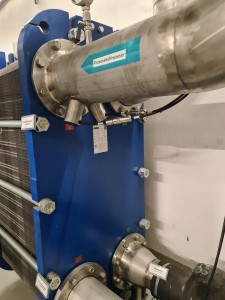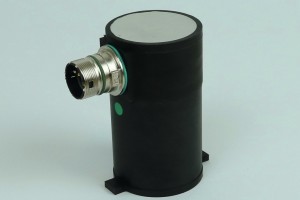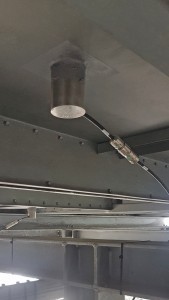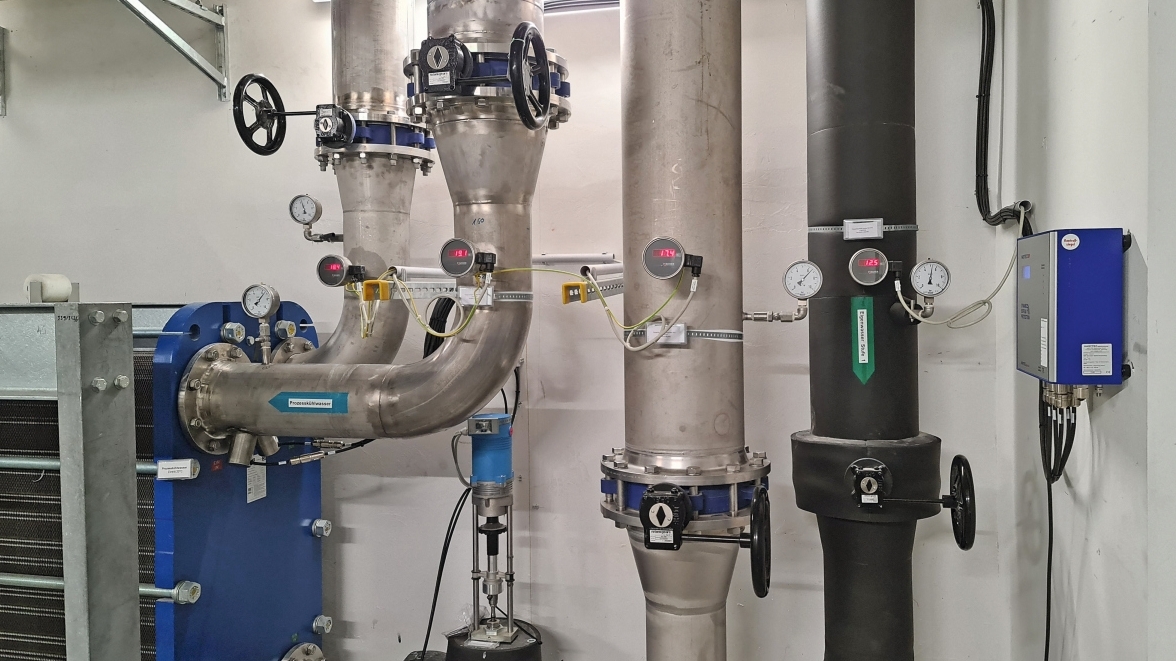Deposits and biocorrosion have a negative impact on the service life and life cycle of machines and therefore have a major influence on the design and planning of processes.
 Bonded transducers Intelligent Deposit Protection is the name of the technology that can be used to prevent the formation of organic and inorganic deposits on all liquid-carrying surfaces. Acoustic transducers are bonded to the outside of the equipment to be protected. As a rule, a carefully selected 2-component epoxy resin adhesive is used. Special high-temperature transducers and adhesives are available for high-temperature applications. The ultrasonic waves penetrate the surface and spread out in the guided medium. They prevent the adhesion of inorganic and organic deposits, including biofilm, which significantly reduces or even completely prevents biocorrosion. One of the basic factors of the technology is the non-gravitational generation of ultrasound, which means that it can be used permanently and preventively. This only has an effect on the deposits and protects the sonicated equipment itself. The technology is maintenance-free.
Bonded transducers Intelligent Deposit Protection is the name of the technology that can be used to prevent the formation of organic and inorganic deposits on all liquid-carrying surfaces. Acoustic transducers are bonded to the outside of the equipment to be protected. As a rule, a carefully selected 2-component epoxy resin adhesive is used. Special high-temperature transducers and adhesives are available for high-temperature applications. The ultrasonic waves penetrate the surface and spread out in the guided medium. They prevent the adhesion of inorganic and organic deposits, including biofilm, which significantly reduces or even completely prevents biocorrosion. One of the basic factors of the technology is the non-gravitational generation of ultrasound, which means that it can be used permanently and preventively. This only has an effect on the deposits and protects the sonicated equipment itself. The technology is maintenance-free.
Proven in shipping, optimized for industry
The innovative ultrasonic technology was first used in the field of industrial shipping. After the system proved successful there, its industrial use came about more by chance. For test purposes, the process was installed on a plate heat exchanger and a cooling tower. The results were convincing and the system has been used in various industrial sectors for around three years.
"Especially at the beginning, we had to do a lot of convincing to get a foot in the door," admits Jan Kelling, Co-Founder and Head of Sales. "We maintain very close contact with our customers in order to solve any problems as quickly as possible and guarantee smooth operation and the best possible results. By communicating directly with customers, we can derive optimizations and improvements and even get suggestions for new areas of application that we hadn't yet considered," says the co-founder happily.
Ultrasound 2.0 meets Industry 4.0
 SchallgeberIntelligentDeposit Protection is the newly developed process that has been specially optimized to meet the requirements of industry. The previously used DBP® technology was installed and then played its frequency band; subsequent adjustments were not possible. It was also only possible to evaluate parameters or carry out a fault analysis to a limited extent. The propagation of the ultrasonic waves depends, among other things, on the density of the medium, the ambient temperatures, the layer thickness of the transmitting material and the solids content in the medium itself. Finally, the frequency of the application to be treated also plays an important role. This results in very different performance requirements for different liquids, emulsions and products. The IDP technology, which has now been further developed, autonomously measures the variables mentioned and uses them to determine the required frequencies and outputs. It also recognizes deviations from these determined values and independently and permanently makes the necessary adjustments so that the optimum combination of power and frequency is always available. In addition, the power of the IDP has been increased 3.5-fold compared to its predecessor and power duration variables have been integrated. This enables an even broader power spectrum. Thanks to the newly integrated USB port, future system and software updates can be easily installed via Plug & Play. This allows the system to be expanded with already planned content and at the same time offers the opportunity to create and subsequently add specially adapted frequency bands or similar for the customer's needs. External devices can also be connected. The problem of limited error analysis and result evaluation has also been addressed and revised. Now almost all data from the control box to the individual transducer can be read out and analyzed. This includes running times, performance analyses and error messages from individual components. The aim of the modifications is to ensure that the customer can rely on the system at all times. The extended error analysis of the interface created, the artificial action of the system and the ability to install updates ensure the basis for Industry 4.0. IDP supports the customer in ensuring an optimized, resource-conserving and environmentally friendly process cycle, while at the same time increasing the production and operational reliability of the systems and the expected service life.
SchallgeberIntelligentDeposit Protection is the newly developed process that has been specially optimized to meet the requirements of industry. The previously used DBP® technology was installed and then played its frequency band; subsequent adjustments were not possible. It was also only possible to evaluate parameters or carry out a fault analysis to a limited extent. The propagation of the ultrasonic waves depends, among other things, on the density of the medium, the ambient temperatures, the layer thickness of the transmitting material and the solids content in the medium itself. Finally, the frequency of the application to be treated also plays an important role. This results in very different performance requirements for different liquids, emulsions and products. The IDP technology, which has now been further developed, autonomously measures the variables mentioned and uses them to determine the required frequencies and outputs. It also recognizes deviations from these determined values and independently and permanently makes the necessary adjustments so that the optimum combination of power and frequency is always available. In addition, the power of the IDP has been increased 3.5-fold compared to its predecessor and power duration variables have been integrated. This enables an even broader power spectrum. Thanks to the newly integrated USB port, future system and software updates can be easily installed via Plug & Play. This allows the system to be expanded with already planned content and at the same time offers the opportunity to create and subsequently add specially adapted frequency bands or similar for the customer's needs. External devices can also be connected. The problem of limited error analysis and result evaluation has also been addressed and revised. Now almost all data from the control box to the individual transducer can be read out and analyzed. This includes running times, performance analyses and error messages from individual components. The aim of the modifications is to ensure that the customer can rely on the system at all times. The extended error analysis of the interface created, the artificial action of the system and the ability to install updates ensure the basis for Industry 4.0. IDP supports the customer in ensuring an optimized, resource-conserving and environmentally friendly process cycle, while at the same time increasing the production and operational reliability of the systems and the expected service life.
Areas of application
 Cooling towerInaddition to a metallic and liquid-carrying surface, a permanent power supply is requiredforan application. There are special installation options for effectively applying IDP to plastic pipes. In general, a distinction is made between process-related applications such as plate heat exchangers, pipelines, industry-specific applications (cooling emulsion coolers, pasteurizers, bottle washers, glue distributors, milk heaters), tanks and cooling applications such as cooling towers, wet separators, evaporative cooling systems and plate heat exchangers. Practical experience shows that by using ultrasonic technology, the addition of biocides in evaporative cooling systems, cooling towers and wet separators can be reduced to a minimum and the corresponding systems can still be operated safely within the limits of the Federal Immission Control Ordinance (42nd BImSchV). This makes an important contribution to ensuring production safety. In the areas of plate heat exchangers and pasteurizers, maintenance and cleaning work can be carried out at longer intervals, as considerable extensions to service life are made possible. By addressing customer problems, the company was able to develop earlier customer requests, such as the use of pasteurizers and bottle washers, into today's standard applications and incorporate the knowledge gained in other industries. A good example is the application in a steelworks in Central Europe, where the technology is used to prevent biofilm as well as fouling by the zebra mussel introduced in Europe in parts of the cooling system. Fouling is of increasing economic importance for companies in a wide range of industries. Biocorrosion not only reduces the life cycles of liquid-carrying systems and equipment and makes it necessary to replace tanks, pipes and coolers prematurely. At the same time, operating costs also increase due to the necessary maintenance work. An additional, often underestimated cost driver is the reduction in efficiency/performance (heat transfer coefficients) of the individual components, which increases the overall energy requirement of the industrial plant. A factor that should not be neglected is the necessary use of biocides, which is reflected in the ecological costs.
Cooling towerInaddition to a metallic and liquid-carrying surface, a permanent power supply is requiredforan application. There are special installation options for effectively applying IDP to plastic pipes. In general, a distinction is made between process-related applications such as plate heat exchangers, pipelines, industry-specific applications (cooling emulsion coolers, pasteurizers, bottle washers, glue distributors, milk heaters), tanks and cooling applications such as cooling towers, wet separators, evaporative cooling systems and plate heat exchangers. Practical experience shows that by using ultrasonic technology, the addition of biocides in evaporative cooling systems, cooling towers and wet separators can be reduced to a minimum and the corresponding systems can still be operated safely within the limits of the Federal Immission Control Ordinance (42nd BImSchV). This makes an important contribution to ensuring production safety. In the areas of plate heat exchangers and pasteurizers, maintenance and cleaning work can be carried out at longer intervals, as considerable extensions to service life are made possible. By addressing customer problems, the company was able to develop earlier customer requests, such as the use of pasteurizers and bottle washers, into today's standard applications and incorporate the knowledge gained in other industries. A good example is the application in a steelworks in Central Europe, where the technology is used to prevent biofilm as well as fouling by the zebra mussel introduced in Europe in parts of the cooling system. Fouling is of increasing economic importance for companies in a wide range of industries. Biocorrosion not only reduces the life cycles of liquid-carrying systems and equipment and makes it necessary to replace tanks, pipes and coolers prematurely. At the same time, operating costs also increase due to the necessary maintenance work. An additional, often underestimated cost driver is the reduction in efficiency/performance (heat transfer coefficients) of the individual components, which increases the overall energy requirement of the industrial plant. A factor that should not be neglected is the necessary use of biocides, which is reflected in the ecological costs.
The issue of biofouling, deposits and biocorrosion is becoming increasingly important. This is not only due to the ecological aspects alone, but is based much more on an increasingly detailed consideration of individual processes, interrelationships and the resulting outcomes. Small things can have a big impact, even in a positive sense. Last year, the company was awarded the German Innovation Prize for this technology.


